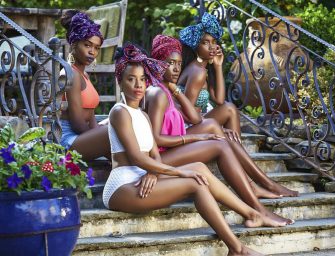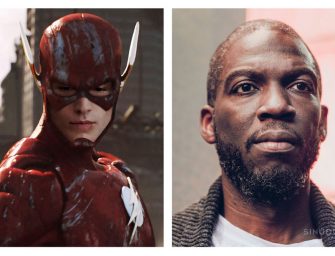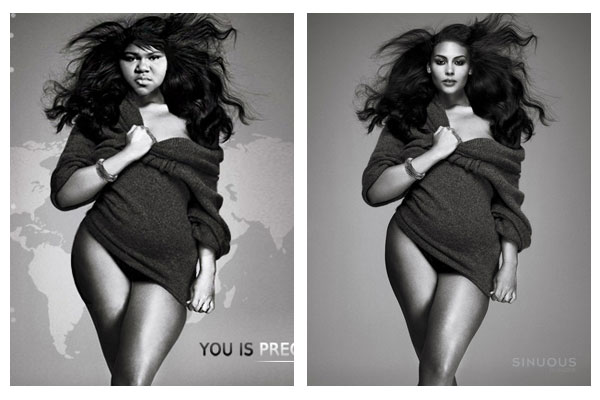In wake of controversy, should the upcoming biopic on Nina Simone be stopped?
As outrage swirls around the casting of Zoe Saldana as Nina Simone in the first film about her life, the legend’s daughter and content team have been relentlessly denouncing the movie via social media.
This week, author and NinaSimone.com content manager Aaron Overfield called out every inaccurate facet of the biopic, from the casting of Zoe who has been photographed in dark makeup and prosthetics, to the “artistic license” taken with the script by the film’s director, Cynthia Mort . Read some of what he had to say below:
“Zoe’s complexion (the level of her “blackness”) has taken the forefront in the discussion. Her complexion as well as her phenotype/features. We’re going to have to address this since obviously it is dominating the outcry against this project, understandably so. However, I believe this issue is a byproduct of the much, much larger issue: the total gentrification of Nina Simone. This occurred at the inception of this film so it’s no wonder the script and casting have come to symbolize the total fictionalization of Nina as a person and as an artist.
The script, written by Latin American writer and first time director Cynthia Mort, is based in a series of lies. That is our starting point. Cynthia calls this her “artistic license.” Under that umbrella what Cynthia is implying is that she can pretty much do whatever the hell she wants and she doesn’t have to listen to anyone. Cynthia has focused her story on Nina’s relationship with her personal assistant, Clifton Henderson , himself a controversial person in Nina’s life. Well before Nina’s death, before talks about a movie, there were issues expressed about Clifton’s intentions regarding Nina and his efforts to seemingly keep her isolated. He was around Nina for the last few years of her life. He can be seen with her in a filming of Nina’s concert in Brazil in 2000, during shots of Nina being interviewed in a boat .
After Nina’s death, Clifton sold his story to Cynthia and that became the basis for the movie. So, a (controversial) personal assistant’s relationship with Nina Simone for the very last few years of her life somehow became the focal point of the first ever Nina Simone movie. Moreover, that controversial relationship became fictionalized by Cynthia Mort by her writing the relationship as a romantic one (putting Nina in the role as sexual aggressor and as emotionally needy).
As has been stated before but is worth repeating: Clifton Henderson was a gay man. He was an out gay man. I met him at the Abyssinian Baptist Church in Harlem during Nina’s memorial service. He was neither a heterosexual male nor a man that Nina Simone had any kind of romantic relationship with. This might be a forgivable “fiction” for Cynthia to slip in if not for how many other fictions and whitewashings are built around this tale. Would Cynthia Mort be pleased with someone rewriting her own history to the point where her sexuality becomes a trivialized inconvenience? It is also the first instance of Cynthia’s script exploiting a marginalized identity by essentially putting “straightface” on an out gay man. This is rather curious since Mort herself is a lesbian and you’d wonder how she’d feel being rewritten as a heterosexual woman under the guise of someone else’s “artistic license.” Would Cynthia Mort be pleased with someone rewriting her own history to the point where her sexuality becomes a trivialized inconvenience? I guess someone would have to ask her that. I won’t bother.
The story of the movie is said to use this lie of a relationship as a focal point whereby they flash back to other moments in Nina’s life including other relationships and some of Nina’s music career. We don’t know much else than that. We know (or assume) there will be some mention of Nina’s civil activism, and her “rise and fall.” Tight-lipped as any filmmaker is, there’s not much else we can know.
However, based on all the clues available we can know this with certainty: the first film about Nina Simone is leaving out anything about Nina Simone that made her oh so very Nina Simone.
How, other than the fictionalized relationship being used as a focal and reference point for the script, can we know this?”
Aaron continues to lay into Mort ‘s “rewriting of history” and then breaks down the issue of Zoe ‘s casting:
“Discussions over Zoe being or not being “black enough” are the most heated and the most prevalent. While I understand this, I think it deals only with the symptom of what is going on rather than the underlying gentrification of Nina’s identity itself. I would argue that if the script accurately reflected Nina Simone – the true, very real, very raw Nina – it would’ve taken a different direction entirely and we would not be forced to look at Zoe Saldana in black(er)face and prosthetics. If they were telling the true story of Nina Simone, Zoe would not have ended up in this role.
The very casting of Zoe itself was based in the still present subtleties of racism, colorism, and beauty standards.
The fact that Zoe ended up being approached for the role (which might make sense considering Cynthia Mort is Latin American), is indicative of the same system that Nina fought her entire life. It shows the entire movie has been misguided from the beginning and Cynthia Mort’s “artistic license” is no more than a spit in the face of Nina’s legacy.
People who say that Zoe’s complexion and features shouldn’t matter are ignoring the fact that they are going to such lengths to darken her skin and change her features, thereby proving those things DO matter. Since Zoe was approached for this film, it has to make you wonder why she was ever approached in the first place. Given the history of Nina Simone: her pride in being a dark skinned woman with her features while lamenting treatment based on skin tone (give Four Women a listen), plus her desire to inspire younger women with similar features – why was Zoe ever approached in the first place?”
While Aaron says they have no plans to attempt shutting the movie down, the fight to expose its deceptiveness continues. “Nina recognized injustice, and Nina never shut up,” he concludes. “ So should we, and neither should we.”
Read The Full Letter
Follow Nina’s team on Twitter at @NinaSimoneMusic .
Author























